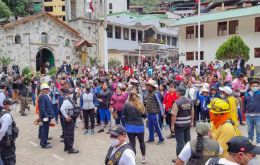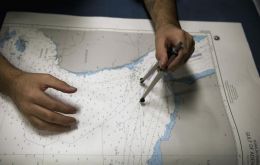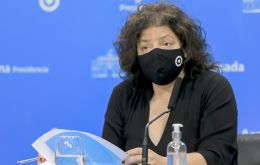MercoPress. South Atlantic News Agency
Stories for July 29th 2022
-
Friday, July 29th 2022 - 19:24 UTC
Brazil reports first death of patient with monkeypox

Brazilian health authorities Friday confirmed the first death linked to monkeypox in the country: a 41-year-old man, who was already under treatment for other diseases, including cancer, which caused the worsening of his health condition.
-
Friday, July 29th 2022 - 19:20 UTC
Machu Picchu increases capacity to appease angry tourists

Operators at the Machu Picchu Inca citadel in Peru have agreed to increase the site's capacity from 4,000 to slightly over 5,000 tourists after protests from would-be travelers, it was announced Thursday.
-
Friday, July 29th 2022 - 19:15 UTC
Boosted by Brazil and Mexico, Latin America's economy expected to expand 3% in 2022, IMF

Given the improved performance of Latin America's largest economies, particularly Brazil, Mexico, Colombia and Chile, the IMF has raised the 2022 growth projection for the Latam and the Caribbean.
-
Friday, July 29th 2022 - 19:14 UTC
UK Hydrographic Office will end global paper chart production by late 2026

The UK Hydrographic Office (UKHO) has announced it intends to withdraw from global paper chart production by late 2026. The UKHO said it will develop “viable, official digital alternatives for sectors still using paper chart products”.
-
Friday, July 29th 2022 - 19:02 UTC
Brazilian steel exports to the EU soar 830% in five months because of the Ukraine war

Brazilian steel industry sales have ballooned since the start of the war in Ukraine sparked by the Russian invasion of its territory, which began in February. According to Steel Institute data, shipments of the metal raw material to the European Union increased by more than 830% in the first five months of this year, y-to-y, coinciding with the period of warfare in Eastern Europe.
-
Friday, July 29th 2022 - 10:26 UTC
Dissertation: Spanish-English contact in the Falkland Islands

By Yliana Rodríguez (*) for MercoPress – A cosmic coincidence happened to me some months ago. I was notified that my PhD defense committee only coincided on June 14, meaning that would be the date to defend my thesis about Falkland Islands English in contact with Spanish.
-
Friday, July 29th 2022 - 09:55 UTC
Who's who in Argentina after Thursday's cabinet reshuffle

After Thursday's announcement of a large-scale cabinet reshuffle at Casa Rosada, the administration of President Alberto Fernández also announced the new destinations of the departing officials.
-
Friday, July 29th 2022 - 09:49 UTC
Slight increase in unemployment, Uruguayan statistics bureau reports

Unemployment in Uruguay has grown from 8.1% in May to 8.4% in June, according to a National Statistics Institute (INE) report on Activity, Employment and Unemployment released Thursday.
-
Friday, July 29th 2022 - 09:43 UTC
Brazil passes law for speedier installation of 5G antennas

Brazilian President Jair Bolsonaro Thursday signed into law the new provisions for the installation of 5G antennas nationwide, it was announced. The head of state passed the bill in full, meaning he chose not to exercise his veto rights on any part of the document.
-
Friday, July 29th 2022 - 09:40 UTC
Argentine health authorities devise strategies against monkeypox

Argentine Health Minister Carla Vizzotti convened a meeting with “experts” to generate “strategies to strengthen epidemiological surveillance, work together with the jurisdictions to decentralize diagnosis, train health teams and generate information actions for society.”
